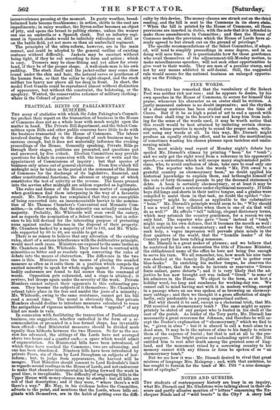PRACTICAL HINTS ON PARLIAMENTARY BUSINESS.
Tan array of statistics with which Sir John Pakington's Commit- tee preface their report on the transaction of business in the House of Commons does not as a whole bear with much weight upon the matter in hand. The Private Bill department, and the Select Com- mittees upon Bills and other public concerns have little to do with the business transacted in the House of Commons. The labour involved during the day in the disposal of such business may be onerous enough, but it does not materially influence the evening proceedings of the House. Generally speaking, Private Bills go through their stages, petitions are presented, and questions put and answered, by five o'clock. Election Committees may provide questions for debate in connexion with the issue of writs and the appointment of Commissions of inquiry ; but that species of business only arises out of general elections. From five o'clock till midnight may be taken as the period at the command of the House of Commons for the discharge of its legislative, financial, and other constitutional functions, the advance or stoppage of which constitutes the test of activity or the reverse. The hours pressed into the service after midnight are seldom regarded as legitimate.
The rules and forms of the House become matter of complaint when gentlemen find them interposing in the way of a favourite result. Mr. Newdegate has complained that they are susceptible of being converted into an insurmountable barrier to the nomina- tion of Mr. Thomas Chambers's Conventual and Monastic Com- mittee,—in other words, that the minority can actually control the majority. Probably, Mr. Whiteside will soon swell the outcry, not as regards the nomination of a Select Committee, but in refer- ence to his bill devised for the interesting purpose of protecting nuns against undue influence in the disposal of their property. Mr. Chambers backed by a majority of 186 to 119, and Mr. White- side supported by 68 to 40, are unable to get on. There is no reason to believe that any alteration of the existing roles, short of a serious interference with the deliberative principle, would meet such cases. Ministers are exposed to the same tactics as Mr. Chambers and Mr. Whiteside. They have had to contend with minorities as bitter and as resolute upon converting the rules of debate into the means of obstruction. The difference in the two eases is this. Ministers have the means of placing the assailed measure as often as it suits them in a position which compels the excited minority to speak for whole nights against it. Powers of bodily endurance are found to fail sooner than the command of words. Opposition gets exhausted, and a stage is attained ; it revives, but droops again under the severity of the work. Private Members cannot subject their opponents to this exhausting pro- cess. They become the subjects of it themselves ; Mr. Chambers's retreat takes place in the face and amidst the jeers of a minority ; Mr. Whiteside, owing to the same resistance, cannot get his bill read a second time. The moral is obviously this, that private Members should decline to introduce measures calculated to rouse the antipathies of vigorous minorities, to whom "appeals" of any kind are made in vain.
In connexion with facilitating the transaction of Parliamentary business, one suggestion, whether embodied in the form of a re- commendation or presented in a less formal shape, has invariably been offered—that Ministerial measures should be divided more equally than hitherto between the two Houses. So far as the sea- non has advanced, the sittings of the Lords have not averaged above two hours and a quarter each,—a space which would admit of augmentation. Six Ministerial bills have been introduced, of which three have reached the Commons ; two are advancing, and one has been abandoned. Nineteen bills have been introduced by private Peers, six of them by Lord Brougham on subjects of law- reform ; but, to judge from appearances, the harvest will be meagre. That Ministers should consent to Lord Redesdale's limit as regards second readings in the House of Lords, and not endeavour to make that chamber instrumental in helping forward the work in od time, is inexplicable. The difficulty of originating bills in the tipper House with money-clauses may be started but all bills are not of that description ; and if they were, "where there's a will There's a way." Mr. May, in his evidence before the Committee, adverts to the point, and mentions that the Lords, where bills ori- ginate with themselves, are in the habit of getting over the diffi- culty by this device. The money-clauses are struck out on the third reading, and the bill is sent to the Commons in its shorn state. "When the bill is printed by the House of Commons, all those provisions are inserted in italics, with the note that it is intended to make those amendments in Committee ; and then the House of Commons makes the provisions which the House of Lords have al- ready agreed to but struck out on the ground of privilege." The specific recommendations of the Select Committee, if adopt- ed, will tend to simplify proceedings in some degree, and in so doing will save time. It is questionable how far those gentlemen who avail themselves of the adjournment-till-Monday motion, to make miscellaneous speeches, will not seek other opportunities to give vent to their words. They are men of a peculiar stamp, and not by any means addicted to self-denial. Still, the suggested rule would secure for the national business an enlarged opportu- nity on the Fridays.


























 Previous page
Previous page